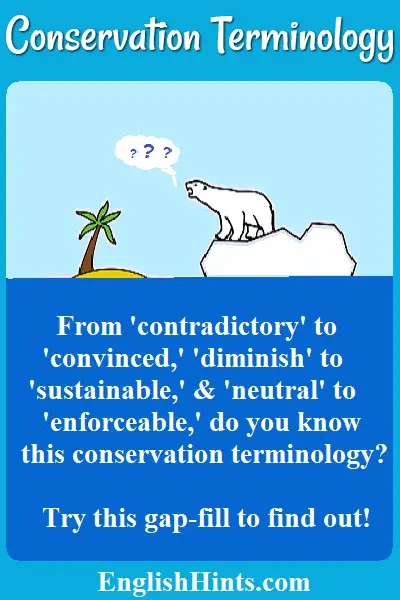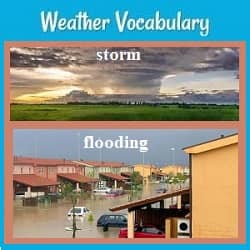Conservation Terminology
Gap-fill Exercises
These gap-fill exercises let you practice useful conservation terminology. Read about international efforts to control global warming as you practice. (You can review other academic vocabulary at the same time. )
For basic climate change vocabulary, start with Climate Change and Weather Vocabulary instead. (That's words like affect, emissions, fossil fuels, etc.) Then come back to this page to learn more.
Use the context clues, prefixes, and suffixes to help you decide which word should go in each gap. (Especially notice the suffixes. They can tell you whether a word is a verb, noun, or adjective. That's a clue for which words might fit in a particular place in the sentence.)
Conservation Terminology: Global Warming
Instructions: Type your answers in the gaps. Choose the best word from the list at the beginning of each section. (See the lists that start with 'assembled,' 'approximate,' and 'advocates.')
If you want a clue, click on the question mark after each gap or the first letter o the word. (The game will subtract a point or more for each hint.)
When you have entered all the answers, click on the "Check" button to check your answers.
Main sources for this article:
Guardian article (“Despite near collapse at each of the last four annual conferences of the UN Framework Convention on Climate Change (UNFCCC), the international negotiations always pull back from the brink. Why? Because no country is willing to abandon the goal...”)
History of Climate Change Negotiations, and
Wikipedia: Global Warming Controversy and History of Climate Change Science.
Note in 2019: These are old articles, and the information in the exercise is also old now, but I'm keeping it, not as news but for the vocabulary practice-- it's main purpose from the beginning. For more recent information, check a reliable news source (of course!)
You might also be interested in an article on penguins and climate change.
________________________________
Home> TOEFL & IELTS Vocabulary > Conservation Terminology Gap-ill Exercises.
Didn't find what you
needed? Explain what you want in the search box below.
(For example, cognates, past tense practice, or 'get along with.') Click to see the related pages on EnglishHints.
| site search by freefind | advanced |







